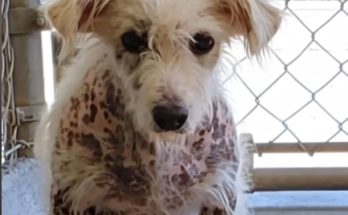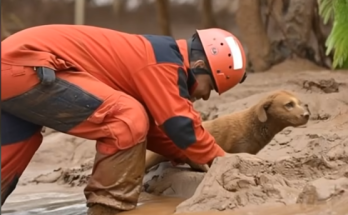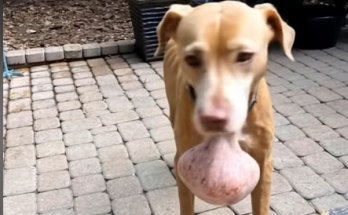I almost stepped over them. Honestly. I was late, it was raining, and I’d just dropped half a grand on a bracelet I didn’t even like.
Then I saw the dog.
Skin stretched tight over bones, head resting in a puddle. One leg twitched like it was dreaming, or maybe just too weak to stop. The woman beside it wasn’t begging. Wasn’t saying anything. Just sitting there, soaked through, plastic poncho clinging to her like a second skin.
Behind her, diamonds glittered on velvet necks. Inside, some high-end handler fussed over a groomed Afghan hound like it was prepping for a royal portrait.
But the real portrait was on the sidewalk.
I kept walking—two steps, maybe three. Then stopped. Backtracked. She didn’t look up. The dog did. Just barely. I crouched, fumbled in my coat pocket. She still hadn’t said a word.
“I’ve got a protein bar,” I offered. “And a bottle of water.”
She nodded once. Eyes flat, hollow. Not rude—just somewhere else. She broke the bar in half and fed it to the dog first, piece by slow piece. No rush. No thanks. Just… care.
That’s when I asked the stupidest question of my life: “Is she yours?”
The woman finally looked at me. And what she said back hit harder than any guilt I’ve ever swallowed.
“She’s all I’ve got left.”
It stopped me cold. Not the words, exactly, but the way she said them. Like she’d already accepted it. Like she’d already said goodbye.
I stayed there for a moment, crouched, watching the dog’s ribs shift with each shallow breath. Her fur was matted, eyes cloudy but alert. Some kind of lab mix, maybe. Hard to tell under all the grime.
“She sick?” I asked quietly.
“Not yet,” the woman said. “But she’s hungry. Cold. She’s… tired.”
I didn’t know what to say. I wanted to ask what happened, why she was out here, but the words felt selfish. Like I was digging for a story to make myself feel something.
Instead, I said, “There’s a café around the corner. I can get you both something warm.”
She looked back down. “They don’t let me in.”
I hesitated. Then asked, “What’s her name?”
“Penny,” she whispered. “Like the coin. Because that’s what someone threw at her the first day we were out here.”
I blinked. “That’s awful.”
The woman shrugged. “Could’ve been worse. At least it wasn’t a bottle.”
I stood slowly. People were still walking by, umbrellas up, eyes averted. Pretending not to see. The jewelry store clerk inside had glanced our way once or twice but said nothing. That seemed about right.
“I’ll be back,” I said.
She didn’t ask where I was going.
I jogged to the café and grabbed two sandwiches, a cup of chicken soup, a chai latte, and a bottle of water. Threw in two dog biscuits from a little basket near the counter—meant for customers with pets. The cashier gave me a weird look. I didn’t care.
When I got back, she hadn’t moved. Neither had Penny. But when I knelt and opened the soup container, the dog’s nose twitched.
“She’s picky with meat,” the woman said. “Hates ham.”
“It’s chicken.”
Penny inched forward and sniffed. The woman took the sandwich and broke it up, letting Penny eat from her hands again. I handed over the soup and chai.
“I’m Dylan,” I offered.
She blinked slowly. “Maeve.”
It suited her. Soft, quiet. Tired but strong underneath. I asked if she needed anything else, and she shook her head.
But I stayed anyway.
Over the next twenty minutes, I learned that she’d been evicted six months ago. Lost her job when the bakery she worked at closed. Fell behind on rent. Shelters were full or unsafe, and Penny wasn’t allowed in most of them anyway.
“I sleep light,” she said. “Can’t afford to miss anything.”
“You ever try outreach?”
Maeve snorted softly. “They came once. Took pictures. Gave me a blanket. Never saw them again.”
My stomach twisted. I looked at Penny, licking soup off Maeve’s fingers. Then I looked at the woman herself—early thirties, maybe. Face still pretty under the grime. She reminded me of my sister. Or how my sister used to be before things got messy.
“Do you trust me?” I asked.
Maeve narrowed her eyes.
“I’m not asking for much. Just… let me put you two in a motel for a couple nights. Warm bed, real shower. I’ll cover it.”
“I don’t need charity,” she said.
“It’s not charity,” I told her. “It’s compassion.”
She hesitated. Looked down at Penny, who had curled up in her lap now, eyes finally closed. Then she nodded.
That night, I drove them to a low-cost motel just outside the city. Paid for three nights up front. I told Maeve I’d check in on the third day. Slipped her a little cash too—barely enough to get by, but better than nothing.
She didn’t say thank you. Not because she wasn’t grateful, but because she wasn’t used to being helped.
I didn’t expect to hear from her again.
But on the third day, I went back—and she was still there. Cleaner. Warmer. Smiling a little.
“You came back,” she said.
“Told you I would.”
Penny barked softly, like she remembered me too. I sat on the motel steps, drinking a gas station coffee while Maeve told me more. About her mom, who passed young. A brother she hadn’t seen in years. About how hard it was to stay visible without becoming a target.
“You stop being a person after a while,” she said. “You just become… part of the sidewalk.”
That stuck with me.
I asked if she’d ever consider working again. She laughed. “Nobody wants to hire someone who lists a bus shelter as their address.”
But I had an idea.
A friend of mine ran a dog grooming business. Small place, family-run. I called him that night and asked if he needed help—cleaning, bathing, anything. Told him Maeve was quiet, hardworking, and came with a dog that probably knew more about loyalty than any of us.
He agreed to meet her.
A week later, she started.
It wasn’t glamorous. Minimum wage, lots of fur and soap and early mornings. But Maeve showed up. Every day. Penny came too—curled up in the corner, full belly, tail wagging.
I kept checking in, sometimes dropping off food, sometimes just talking. She was different now. Lighter. Not fixed, not healed. But alive.
Then something wild happened.
A local journalist, doing a fluff piece on the dog grooming shop, met Maeve. She shared a bit of her story—nothing dramatic, just the truth. The article went online. A day later, it blew up.
People donated. Offered jackets, job leads, a place to stay.
But what mattered most was a letter that arrived a week after that.
It was from her brother.
He hadn’t known where she’d gone. Had been looking for years, left notes at shelters, scoured social media. He drove down from Michigan the following weekend.
I watched them hug outside the shop. Penny barked wildly. Maeve sobbed into her brother’s coat like she was ten years old again.
She didn’t go live with him—not right away. Said she needed to stand on her own two feet first. But they stayed in touch. Regular calls, even visits. Slowly, the pieces began to come back.
Two months after that, Maeve signed the lease on a small studio apartment. Nothing fancy, but hers.
She invited me over the first week.
We sat on the floor, eating boxed mac and cheese with paper forks. Penny snored under the window.
“You saved my life,” she said quietly.
I shook my head. “You did that yourself. I just didn’t walk past.”
Now, a year later, I still stop by sometimes. Penny’s got a shiny new collar. Maeve’s got a sparkle in her eyes. She’s studying part-time now, hoping to open her own grooming business one day.
That bracelet I bought? I returned it. Used the refund to cover her first month’s rent.
Best investment I’ve ever made.
And every time I pass that jewelry store now, I look down.
Because sometimes, the smallest thing—a glance, a twitch, a hungry dog—can pull you back from your own selfish rush. Can remind you that seeing someone is sometimes the most important thing you can do.
If you ever wonder whether helping someone matters… it does.
So, what would you have done if you’d seen them first?
Like, share, and let me know—because maybe your story is the one someone else needs to hear today.



